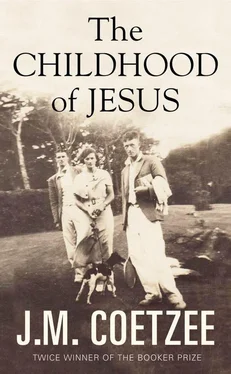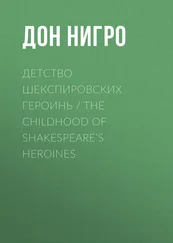Quietly he rises and slips out of the room.
The corridor is empty save for a figure in a long white robe hurrying in his direction. As the figure comes nearer he sees it is none other than Ana from the Centre. ‘Ana!’ he calls out. ‘Hello,’ replies Ana — ‘sorry, I can’t stop, I’m late.’ But then she does stop. ‘I know you, don’t I? I have forgotten your name.’
‘Simón. We met at the Centre. I had a young boy with me. You kindly gave us shelter on our first night in Novilla.’
‘Of course! How is your son doing?’
The white robe is in fact a white towelling bathrobe; her feet are bare. Strange attire. Is there a swimming pool in the Institute?
She notes his puzzled look and laughs. ‘I’m modelling,’ she says. ‘I do modelling two evenings a week. For a life class.’
‘A life class?’
‘A drawing class. Drawing from life. I am the class model.’ She stretches out her arms as if yawning. The fold of the robe at her throat opens; he catches a glimpse of the breasts he had so admired. ‘You should come along. If you want to learn about the body, there is no better way.’ And then, before he can overcome his confusion: ‘Goodbye — I’m late. Say hello to your son.’
He wanders down the empty corridor. The Institute is larger than he had guessed from outside. From behind a closed door comes music, a woman singing mournfully to the accompaniment of a harp. He pauses before a noticeboard. A long list of courses on offer. Architectural Drawing. Bookkeeping. Calculus. Course after course on Spanish: Beginner’s Spanish (twelve sections), Intermediate Spanish (five sections), Advanced Spanish, Spanish Composition, Spanish Conversation. He should have come here instead of struggling with the language all alone. No Spanish literature that he can see. But perhaps literature falls under Advanced Spanish.
No other language courses. No Portuguese. No Catalan. No Galician. No Basque.
No Esperanto. No Volapük.
He looks for Life Drawing. There it is: Life Drawing, Mondays to Fridays 7 to 9 p.m., Saturdays 2 to 4 p.m.; enrolment per section 12; Section 1 CLOSED, Section 2 CLOSED, Section 3 CLOSED. Clearly a popular course.
Calligraphy. Weaving. Basketwork. Flower Arranging. Pottery. Puppetry.
Philosophy. Elements of Philosophy. Philosophy: Selected Topics. Philosophy of Labour. Philosophy and Everyday Life.
A bell rings to mark the hour. Students emerge into the corridor, first a trickle, then a torrent, not just young folk but people of his age too and older, just as Eugenio said. No wonder the city is like a morgue after dark! Everyone is here at the Institute, improving themself. Everyone is busy becoming a better citizen, a better person. Everyone save he.
A voice hails him. It is Eugenio, waving from out of the human tide. ‘Come! We are going to get something to eat! Come and join us!’
He follows Eugenio down a flight of stairs into a brilliantly lit cafeteria. Already there are long lines of people waiting to be served. He helps himself to a tray, to cutlery. ‘It’s Wednesday, which means it’s noodles,’ says Eugenio. ‘Do you like noodles?’
‘Yes, I do.’
Their turn comes. He holds out a plate and a counter hand slaps a big helping of spaghetti onto it. A second hand adds a dollop of tomato sauce. ‘Take a bread roll as well,’ says Eugenio. ‘In case you need to fill up.’
‘Where do we pay?’
‘We don’t pay. It’s free.’
They find a table and are joined by the other young stevedores.
‘How was your class?’ he asks them. ‘Did you work out what a chair is?’
It is meant as a joke, but the young men stare at him blankly.
‘Don’t you know what a chair is?’ says one of them finally. ‘Look down. You are sitting on one.’ He glances around at his companions. They all burst out laughing.
He tries to join in, to show he is a good sport. ‘I meant,’ he says, ‘did you find out what constitutes. . I don’t know how to say it. .’
‘ Sillicidad ,’ offers Eugenio. ‘Your chair’ — he gestures towards the chair — ‘embodies sillicidad , or partakes of it, or realizes it, as our teacher likes to say. That is how you know it is a chair and not a table.’
‘Or a stool,’ adds his companion.
‘Has your teacher ever told you,’ says he, Simón, ‘about the man who, when asked how he knew a chair was a chair, gave the chair in question a kick and said, That, sir, is how I know ?’
‘No,’ says Eugenio. ‘But that isn’t how you learn a chair is a chair. That is how you learn it is an object. The object of a kick.’
He is silent. The truth is, he is out of place in this Institute. Philosophizing just makes him impatient. He does not care about chairs and their chairness.
The spaghetti lacks seasoning. The tomato sauce is simply pureed tomatoes, warmed up. He looks around for a salt cellar, but there is none. Nor is there pepper. But at least spaghetti is a change. Better than everlasting bread.
‘So — which courses do you think you will enrol in?’ asks Eugenio.
‘I haven’t decided yet. I had a look at the list. Quite a range of offerings. I thought of Life Drawing, but I see it is full.’
‘So you won’t be joining our class. That’s a pity. The discussion grew more interesting after you left. We talked about infinity and the perils of infinity. What if, beyond the ideal chair, there is a yet more ideal chair, and so forth for ever and ever? But Life Drawing is interesting too. You could take Drawing this semester — ordinary Drawing. Then you would get preference for Life Drawing next semester.’
‘Life Drawing is always very popular,’ explains another of the boys. ‘People want to learn about the body.’
He searches for the irony, but there is none, as there is no salt.
‘If you want to learn about the human body, wouldn’t a course in anatomy be better?’ he asks.
The boy disagrees. ‘Anatomy tells you only about the parts of the body. If you want to learn about the whole you need to take something like Life Drawing or Modelling.’
‘By the whole you mean. .?’
‘I mean first the body as body, then later the body in its ideal form.’
‘Won’t ordinary experience teach you that? I mean, won’t spending a few nights with a woman teach you all you need to know about the body as body?’
The boy blushes and looks around for help. He curses himself. These stupid jokes of his!
‘As for the body in its ideal form,’ he presses on, ‘we will probably have to wait for the next life before we get to see that.’ He pushes the spaghetti aside half-eaten. It is too much for him, too much stodge. ‘I must go,’ he says. ‘Goodnight. I’ll see you at the docks tomorrow.’
‘Goodnight.’ They make no effort to detain him. And rightly so. How must he seem to them, to these fine young men, hard-working, idealistic, innocent? What can they possibly learn from the bitter miasma he gives off?
‘How is your boy doing?’ asks Álvaro. ‘We miss him. Have you found a school for him?’
‘He isn’t old enough for school yet. He is with his mother. She doesn’t want him to spend too much time with me. His affections will remain divided, she says, as long as there are two adults laying claim to him.’
‘But there are always two adults laying claim to us: our father and our mother. We are not bees or ants.’
‘That may be so. But in any case I am not David’s father. His mother is the mother but I am not the father. That is the difference. Álvaro, I find this a painful subject. Can we drop it?’
Álvaro grips him by the arm. ‘David is no ordinary boy. Believe me, I have watched him, I know what I am speaking about. Are you sure you are acting in his best interests?’
Читать дальше












